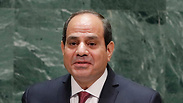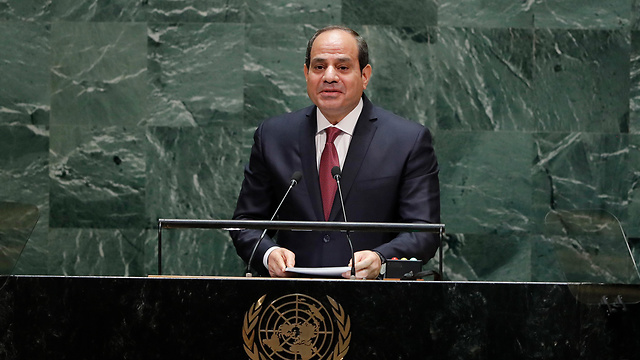
Hamas, backed and financed by the wealthy Emirate of Qatar, is trying to gain international recognition as the sole ruler of the Gaza Strip, and because of that, avoided almost completely from taking part in the fighting this time around.
Palestinian President Mahmoud Abbas cringes at Israel's liaison with its arch-nemesis - Hamas - but he is careful to maintain his own relations with Israel and cooperate with the Jewish State.
El-Sisi, as an observer from the side and as the leader of one of the region's leading countries, can use this to cement his status as the ultimate broker.
Such a behavior is not unprecedented. Menachem Begin and Anwar Sadat were prima facie enemies, but also charismatic leaders who knew how to make peace.
The Egyptian-Israeli peace treaty didn't make the two states too fond of each other, but it cracked the wall of Arab loathing towards Israel, a crack that has been only growing since, like with Israel's blooming relations with Saudi Arabia.
Meanwhile, processes taking place in the Middle East in parallel, especially the upheavals that Iran, Iraq and Libya have gone through in recent years, strengthen the anti-Israeli front in the region.
But el-Sisi acts with determination. He does not shy away from declaring that he "talks a lot" with Prime Minister Benjamin Netanyahu and he is also credited with supporting the two-state solution in a way that will meet the needs of the Palestinians and ensure Israel's security.
The Egyptian president even met with Netanyahu in September 2017 at the United Nations General Assembly in New York, expressing his desire to assist in the efforts to achieve peace between Israel and the Palestinians.
As usual on such issues, we don't know much about the events taking place behind the scenes - but all signs indicate that el-Sisi is not all talk.
Such relationships are complex by their nature. At the time, I was part of Begin's team during the peace negotiations with Egypt. I witnessed the changes in Begin and Sadat's relationship until the peace treaty was signed.
I saw them sailing in their conversations far beyond the framework of the peace talks and it is quite possible that if the Egyptian president had not been assassinated, they would have tried to realize the idea of building a new Middle East, a thought both leaders entertained a number of times.
But history, apace with el-Sisi's overt - and possibly also covert - efforts, raises several questions.
Former member of the Military Intelligence Directorate Lt. Col. Eli Dekel, an expert on Israeli-Egyptian relations, claims that the never-ending Egyptian armament indicates that it wants to restore its former glory and lead the Arab world without carrying the "Israeli peace agreement hump" on its back.
Should we wait for time to enfold el-Sisi's full intentions or should we take a look at Egypt's new submarine that raised many eyebrows in Israel?


















